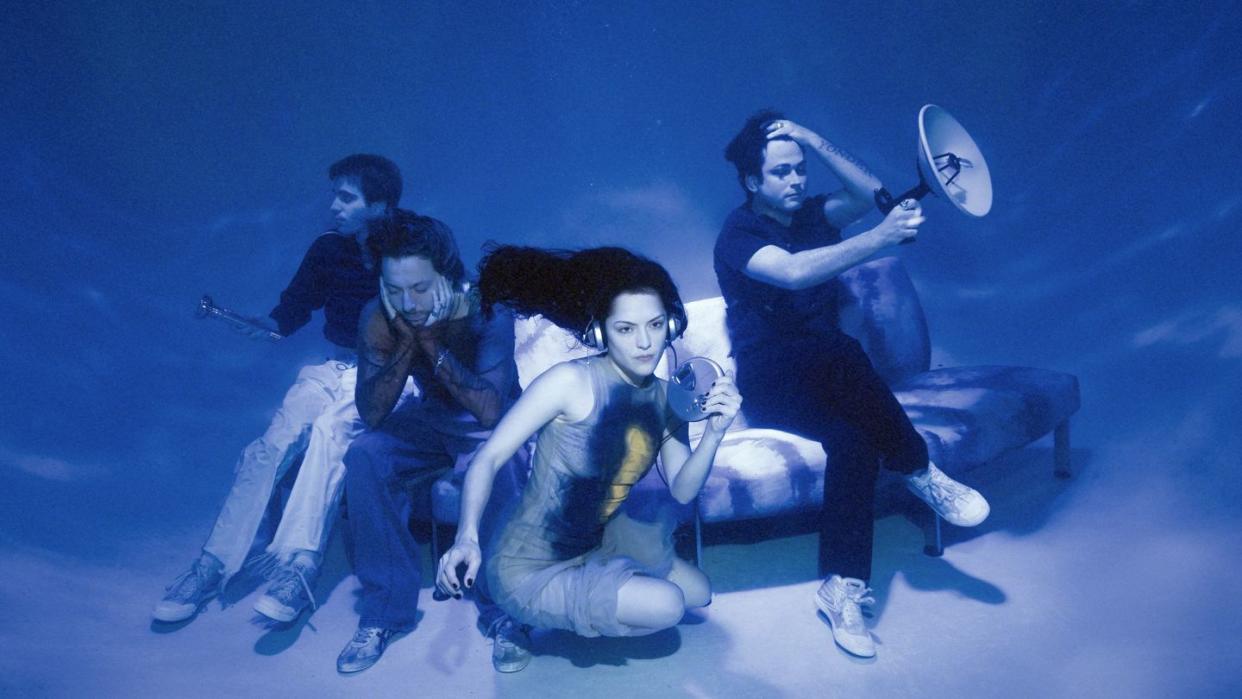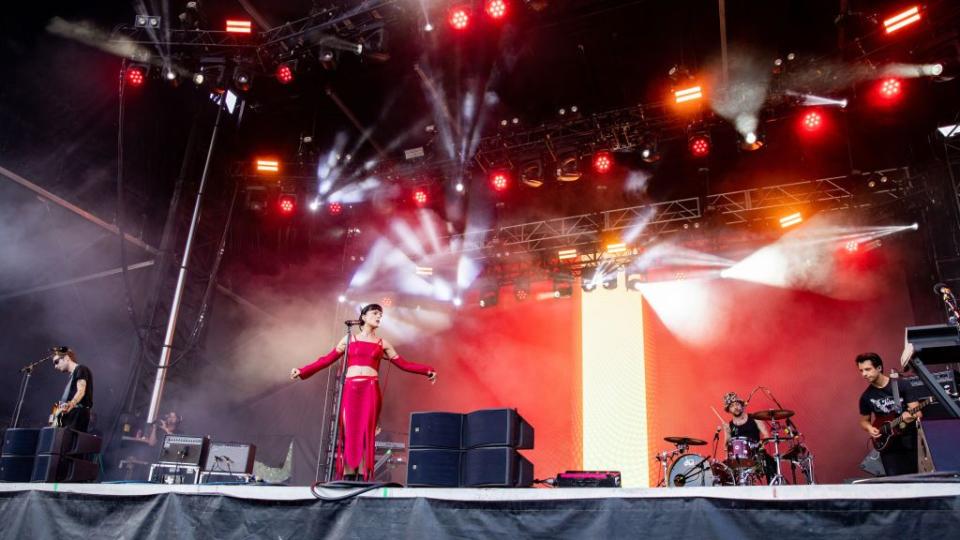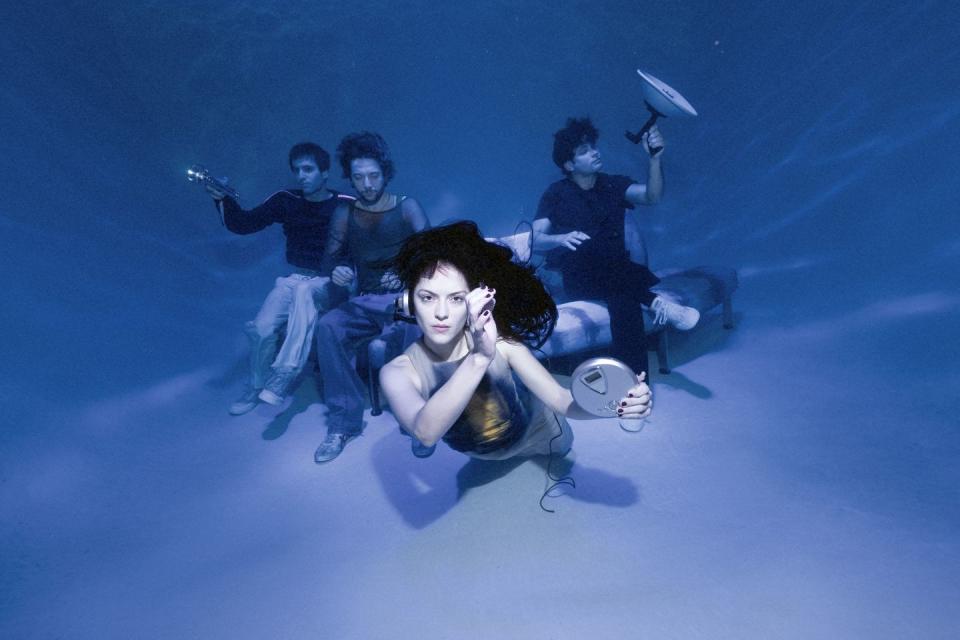How Do You Make an Album with an Ex? Ask The Marías.

L.A. dream-pop outfit The Marías have long captivated audiences with their jazz-inflected indie grooves, which traverse the airwaves in both English and Spanish. Helmed by vocalist María Zardoya, the group wears its sensuality in her hushed melodies, suspended in an ether of reverb.
Yet by 2022, The Marías’ chief songwriters, Zardoya and drummer-producer Josh Conway, reached a stalemate in their romantic relationship. Their sophomore album, Submarine, out Friday, was born from a growing fault line in the band’s foundation. In the atmospheric blue of Submarine, the Marías pearl-dive through the psychic wreckage and surface with a glittering, triumphant treatise on resolving conflict with love.
“We’ve done interviews [where] we were like, ‘Oh yeah, [writing] this was super easy and seamless!’” recalls María, who goes by her first name. “Now I’m like, wait… it actually wasn’t!”
The way that she and Conway tell it, there was no Fleetwood Mac-style meltdown in the studio, nor instruments flung at each others’ heads. Guided by an emotional vigilance so particular to millennials, the band—which also includes guitarist Jesse Perlman and keyboardist Edward James—agreed to a six-week sabbatical in 2023. It was the longest the pair had been apart since they met fortuitously in 2016; Conway happened to be manning the soundboard at the Kibitz Room bar at Canter’s Deli in Los Angeles as the sylphlike María, newly transplanted from Atlanta via Puerto Rico, spellbound the crowd with her delicate serenade.
In the time since, The Marías signed to Atlantic Records, and in 2021, released their Grammy-nominated debut album, Cinema; the lead single “Hush,” a seething alt track that recalled Garbage and The Cardigans, topped Billboard’s Adult Alternative Airplay chart. After having come up alongside fellow Latino indie stars like Cuco and Omar Apollo, The Marías hit a major cross-cultural milestone when they appeared with Bad Bunny on his historic Spanish-language album, Un Verano Sin Ti.
In contrast with the smoldering guitar tones that forged Cinema, the more sprawling electronica soundscape of Submarine speaks to The Marías’ desperation for breathing room. The melodrama crescendos in “Echo”—“Breaking down on the floor/’Cause we both know that this situation’s out of control,” sings María—but in its sequel, the slicked-back funk single “Run Your Mouth,” the band picks up the pace, and María pushes the conversation forward.
Together, albeit platonically, María and Conway spoke to ELLE.com about the making of Submarine, vibing with Bad Bunny, and why taking an Eat, Pray, Love moment was vital to the band’s survival.
You two dated each other for almost the entire time you were in the band, then broke up after releasing Cinema. What did it take to find harmony and write a new record?
María: At the beginning it was definitely rocky. A couple months into writing the album, I [thought] we needed a break, because it was bringing up really uncomfortable emotions. Josh took off to Europe on a solo journey. My aunt died very tragically in Puerto Rico, then [months later] my dad had a stroke. My mom and I made a trip to Big Sur and went to a healing workshop.
Josh Conway: We’d been doing The Marías for seven years straight. I had a one-way flight booked, and I left for six weeks. I have some family in Tel Aviv, Israel, and I had never been. This was before [the October 7th attacks] happened. I saw my cousins in Tel Aviv, then I went to Athens. I went to Croatia. I went to Amsterdam [to see] a friend. I went to places that we wouldn’t [typically] see on tour.
You needed an Eat, Pray, Love moment to make it work.
María: We were in our Eat, Pray, Love era for sure. That was the longest that Josh and I had been apart in [8 years] of knowing each other. It did feel isolating, but it was necessary.
Conway: Vacationing for the sake of vacationing was huge for my mental health. It just made me more eager to get in the ring and write music again. Once I got back, the last two or three months of writing were a breeze.
The song “Lejos De Ti” (Away From You) calls to mind that sense of isolation—both sonically and emotionally, it’s very vast. But the way you tell it, it was very healing!
María: Looking back to the pandemic time, it was difficult to be isolated—but people might agree that it was also a time for the Earth to heal. Wildlife was thriving. The isolation was necessary for us to heal, then come together and make this project. We overcame a lot to make it happen.
You filmed the video in a snowy locale. Can you walk me through the concept and the production?
María: The first lyrics are “El frío, la noche/Siempre me acuerdo de ti.” (“The cold, the night/I always remember you.”) So I thought, “Let’s go find snow!” I wanted to be born in this space. I need to be nude in the snow.” To be born in this Arctic world and recount the memories of a lost love. We shot it in Lake Tahoe, and it was sunny when we got there. We were worried that it was not going to snow.
Conway: We took a giant Snowcat [vehicle] to get up the mountain. Almost the minute we said “Action,” clouds came in and it started pouring snow.
María: I was just wearing a robe. I thought: “Am I gonna die if I do this? Am I gonna get frostbite? Hypothermia?” We didn’t have a medic in the budget! But finally I was like, “Fuck it. I’m going in.”
A bold move for a girl from the tropics.
María: It was the craziest thing I’ve ever done. It felt like a cold plunge, I got that high feeling after. I’m not super woo-woo—like I believe in energy and the universe—but that day I was like, “Maybe I should be more woo-woo because this… was a gift..”

You’ve incorporated your Latinidad in your music over the years. Your father, who is from Puerto Rico, taught you Latin standards on guitar. Did that come to you organically?
María: From day one! I picked up the guitar and the first song that I ever wrote was in Spanish. Then the second was in English. It’s just a testament of how I grew up—I was born in Puerto Rico, then I was raised in Georgia. My mixtapes were all over the place. I would have a Don Omar song, followed by [Deana Carter’s] “Strawberry Wine,” followed by Lauryn Hill, followed by Zion y Lennox. I think Latinos who live in the U.S. can relate to that. Both cultures [make] us who we are.
You both wrote “Otro Atardecer” with Bad Bunny [in 2022], then last year you recorded “Mañana” with Tainy and Young Miko. How did it feel to be welcomed into the Latin music space by these Puerto Rican hitmakers?
María:There have been so many big Puerto Rican artists in the past, but Bad Bunny definitely introduced the world to Puerto Rico. When he reached out, it was a no brainer.
Conway: I was already a huge Bad Bunny fan. María would play Bad Bunny every day. It was kind of drilled into my psyche. We were on tour in Boston one night when he asked us to be on the album. So we flew the next day to L.A. to make the song in one day, then flew back to Chicago to resume the tour.
María: When we started working on the track, we wanted it to lean indie. Latin music is so many different things—it’s not just reggaeton, it’s not just salsa and merengue. It’s not just pop. There’s an alternative world beyond the general market. It was really special to be a part of the album [Un Verano Sin Ti], as a love letter to Puerto Rico. Then working with Tainy on “Mañana” was amazing, because he is a mastermind of his time. He’s behind many of the indie tracks that Bad Bunny’s on. He is so humble and so sweet, and he’s the biggest Latin producer.

You guys got started making music for films, and it shows in your work. In Cinema, you referenced Pedro Almodóvar; in the promo for Submarine, you cited the Blue chapter of Krzysztof Kieślowski’s “Three Colors” trilogy, starring Juliette Binoche. What made you identify with this movie?
María: The whole trilogy is so, so beautiful. This movie in particular spoke to me because I see a very similar character arc that [we] went through writing this album. In Blue, the protagonist loses her family, and her world has crumbled. She has to figure out: “What am I going to do now that I’m alone?” At the beginning of the movie, blue represented the sadness and loss. But as the movie went on, blue started to represent hope and aspiration for the future. She sold her house, found a new apartment, and she started to find herself.
What are other essential movies that you would recommend for Marías fans?
María: Kieślowski’s The Double Life of Veronique. So good. Blue is the Warmest Color, of course. And Garden State. Oh my god, the soundtrack is perfect. Finding the right sounds for the visuals—that’s what makes my brain so happy.
This interview has been edited and condensed for clarity.
You Might Also Like

 Yahoo News
Yahoo News 
